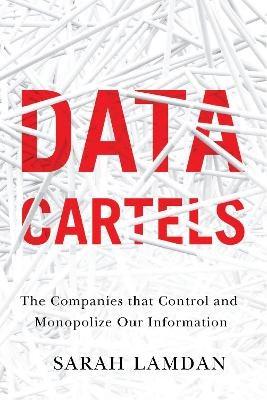
Data Cartels
The Companies That Control and Monopolize Our Information
Seiten
2022
Stanford University Press (Verlag)
978-1-5036-1507-6 (ISBN)
Stanford University Press (Verlag)
978-1-5036-1507-6 (ISBN)
In our digital world, data is power. Information hoarding businesses reign supreme, using intimidation, aggression, and force to maintain influence and control. Sarah Lamdan brings us into the unregulated underworld of these "data cartels", demonstrating how the entities mining, commodifying, and selling our data and informational resources perpetuate social inequalities and threaten the democratic sharing of knowledge.
Just a few companies dominate most of our critical informational resources. Often self-identifying as "data analytics" or "business solutions" operations, they supply the digital lifeblood that flows through the circulatory system of the internet. With their control over data, they can prevent the free flow of information, masterfully exploiting outdated information and privacy laws and curating online information in a way that amplifies digital racism and targets marginalized communities. They can also distribute private information to predatory entities. Alarmingly, everything they're doing is perfectly legal.
In this book, Lamdan contends that privatization and tech exceptionalism have prevented us from creating effective legal regulation. This in turn has allowed oversized information oligopolies to coalesce. In addition to specific legal and market-based solutions, Lamdan calls for treating information like a public good and creating digital infrastructure that supports our democratic ideals.
Just a few companies dominate most of our critical informational resources. Often self-identifying as "data analytics" or "business solutions" operations, they supply the digital lifeblood that flows through the circulatory system of the internet. With their control over data, they can prevent the free flow of information, masterfully exploiting outdated information and privacy laws and curating online information in a way that amplifies digital racism and targets marginalized communities. They can also distribute private information to predatory entities. Alarmingly, everything they're doing is perfectly legal.
In this book, Lamdan contends that privatization and tech exceptionalism have prevented us from creating effective legal regulation. This in turn has allowed oversized information oligopolies to coalesce. In addition to specific legal and market-based solutions, Lamdan calls for treating information like a public good and creating digital infrastructure that supports our democratic ideals.
Sarah Lamdan is Professor of Law at the City University of New York School of Law. She also serves as a Senior Fellow for the Scholarly Publishing and Academic Resources Coalition, a Fellow at NYU School of Law's Engelberg Center on Innovation Law and Policy.
1. The Data Cartels: An Overview
2. Data Brokering
3. Academic Research
4. Legal Information
5. Financial Information
6. News
Conclusion: Envisioning Public Information as a Public Good
| Erscheinungsdatum | 11.10.2022 |
|---|---|
| Verlagsort | Palo Alto |
| Sprache | englisch |
| Maße | 152 x 229 mm |
| Themenwelt | Recht / Steuern ► EU / Internationales Recht |
| Recht / Steuern ► Öffentliches Recht | |
| Recht / Steuern ► Wirtschaftsrecht ► Urheberrecht | |
| ISBN-10 | 1-5036-1507-3 / 1503615073 |
| ISBN-13 | 978-1-5036-1507-6 / 9781503615076 |
| Zustand | Neuware |
| Informationen gemäß Produktsicherheitsverordnung (GPSR) | |
| Haben Sie eine Frage zum Produkt? |
Mehr entdecken
aus dem Bereich
aus dem Bereich
Gesetz gegen den unlauteren Wettbewerb, Preisangabenverordnung, …
Buch | Softcover (2024)
dtv Verlagsgesellschaft
CHF 23,65
Buch | Softcover (2023)
C.H.Beck (Verlag)
CHF 45,95


